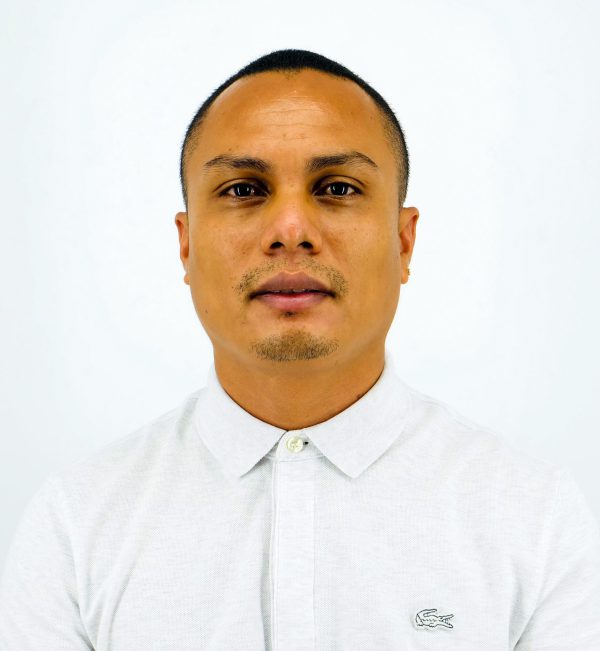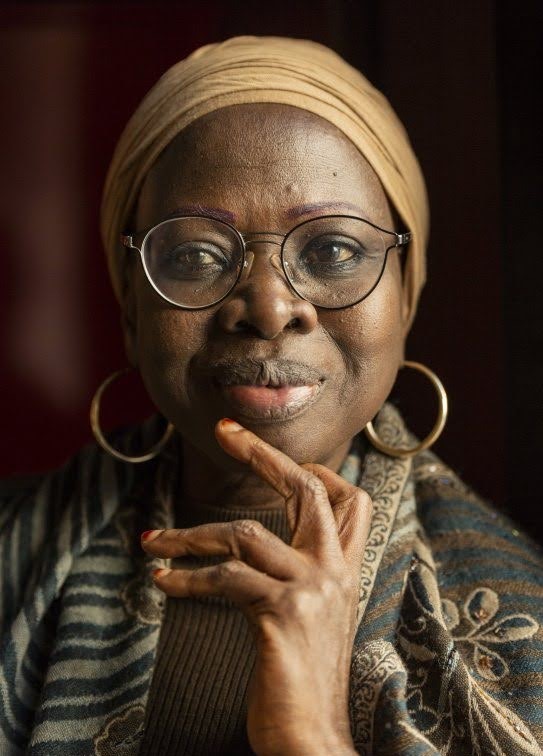Kalamazoo College will mark the relaunch of its African studies concentration in May with Africa Month 2025, a vibrant celebration organized by Director of African Studies Dominique Somda and Assistant Professor of French Manfa Sanogo.
Africa Month will invite thoughtful and meaningful engagement with Africa and Afro-descendants worldwide thanks in part to support from a Howard Hughes Medical Institute (HHMI) Inclusive Excellence grant and the Arcus Center for Social Justice Leadership. They will welcome visionary scholars, artists, curators and thinkers whose work challenges certitudes and expands horizons.
The events, all at the Arcus Center at 201 Monroe St. in Kalamazoo, include:

- Divine Fuh of the University of Cape Town in an opening lecture titled “Decolonizing Knowledges and Building Transformative Partnerships” on Friday, May 9, at 4:15 p.m.
- The opening of an art exhibit titled Becoming of the Day: Refusing the Timeline, featuring artist Anthony Obayomi of the University of Illinois-Urbana-Champaign on Friday, May 9, at 6 p.m.
- A faculty and staff workshop titled “Disobedient Pedagogies in Liberal Arts Education” on Saturday, May 10, at 9 a.m.
- A roundtable discussion titled “Rethinking the Ethics of Knowledge with the Global South” featuring speakers Herimampita Rarivomanantsoa of Université d’Antananarivo, Madagascar, and Cyndy Garcia Weyandt of Kalamazoo College on Saturday, May 10, at 2 p.m.
- A public lecture titled “African Disobedient Feminism: Madness as an Approach to Emancipation” with writer Ken Bugul of Senegal on Saturday, May 10, from 5:30 p.m.
- A conversation with artist and art professor Chido Johnson titled “Sadza Space: The Zimbabwe Cultural Centre in Detroit” on Sunday, May 11, at 11 a.m.
- A luncheon and Haitian Flag Day lecture titled “Untimely Periodicals: Haiti and the Archives of Caribbean Thought” with speakers Medhi Chalmers and Carine Schermann of Florida State University on Sunday, May 11 at noon.
Somda said she is immensely grateful for an opportunity to welcome colleagues, guests and students to discussions about Africa. She added that the relaunched African studies concentration will offer students a wealth of enriching opportunities through an expanded curriculum and fresh perspective.
“Our new program deliberately extends beyond continental boundaries to embrace Africa’s full geographic and intellectual reach—including its edges, islands and diasporic extensions across the globe,” Somda said. “Beginning next fall, students can enroll in our new core course, Global Africa, which explores these interconnections. In winter term, our course Thinking Africa will centralize the continent’s deep historical connections with the world and its foundational role in critical intellectual traditions. Beyond coursework, the African studies program is planning year-round engagement through curated events, including film screenings, scholarly talks and unique forums for intellectual exchange. These dynamic encounters will create spaces for students to engage directly with diverse perspectives and cutting-edge scholarship. By taking this more expansive approach to African Studies, students will develop a sophisticated understanding of Africa’s global significance and participate in reimagining how we study, understand, and engage with Africa and its diasporas in the contemporary world.”
Sanogo, as a postcolonial scholar and language instructor, anticipates exciting opportunities for students inside and outside the classroom.
“By centering the diaspora, or rather by decentering the continent, the program deconstructs hierarchies of power and knowledge and invites students to reimagine the world from the perspectives of Africa and its diaspora while thinking critically about the global flow of knowledge, power and culture,” Sanogo said.








“This includes access to courses rooted in Black intellectual traditions; reevaluating what constitutes African languages, extending that privilege to French and Spanish, for example; and learning African languages, exploring study abroad programs in Black-majority regions such as Dakar and Nairobi.”
More information on the African studies concentration and Africa Month 2025 events will be available soon online.
